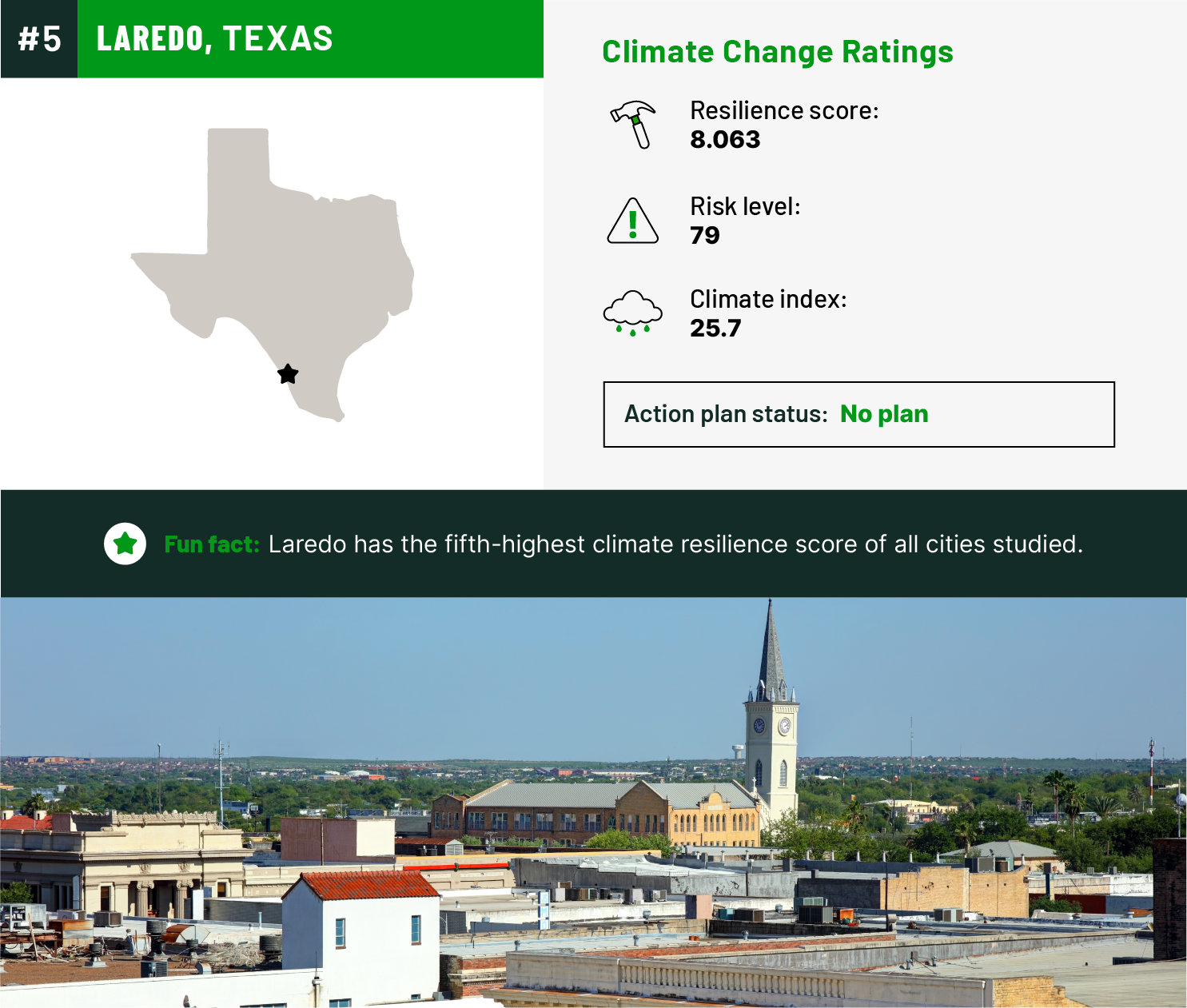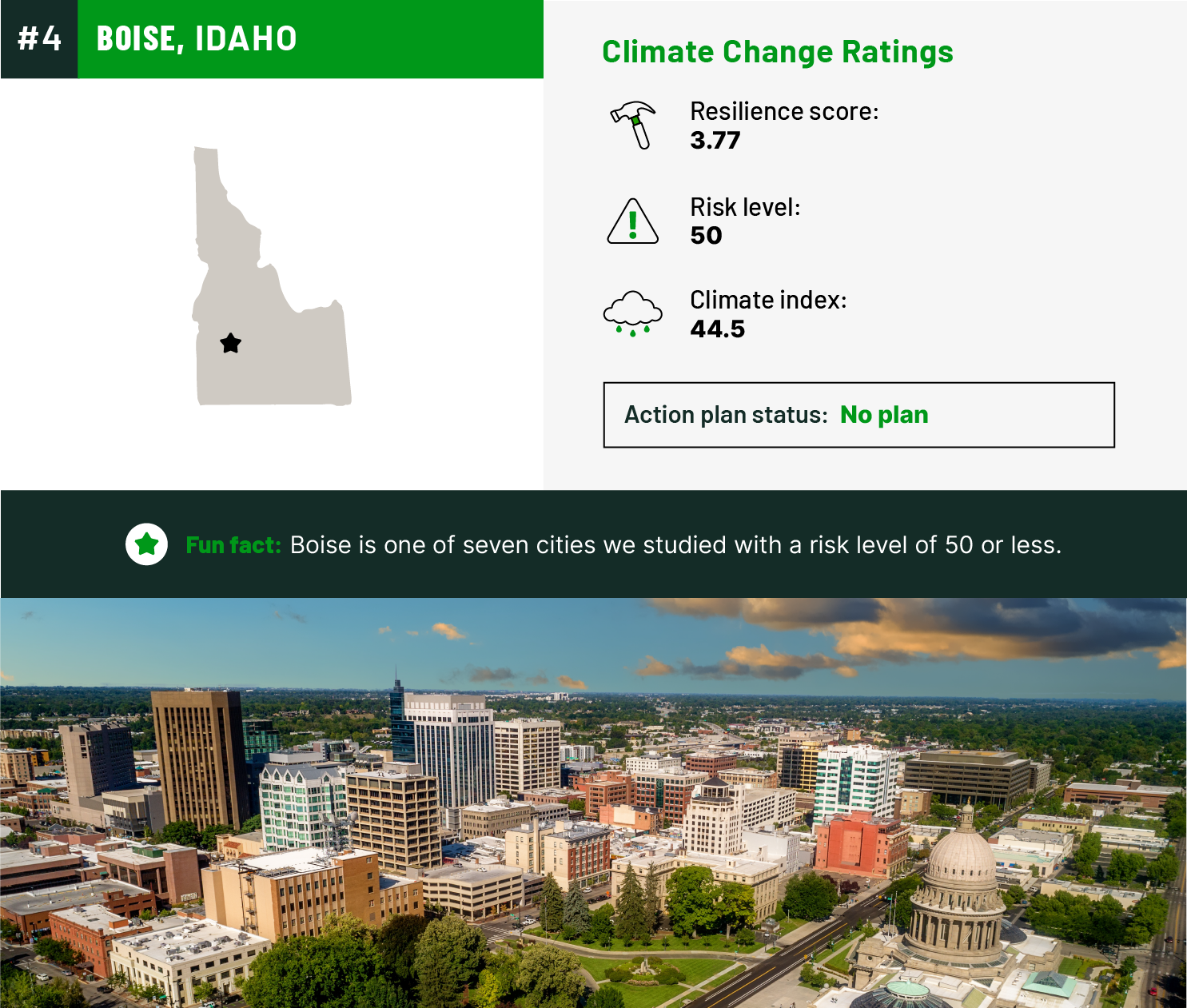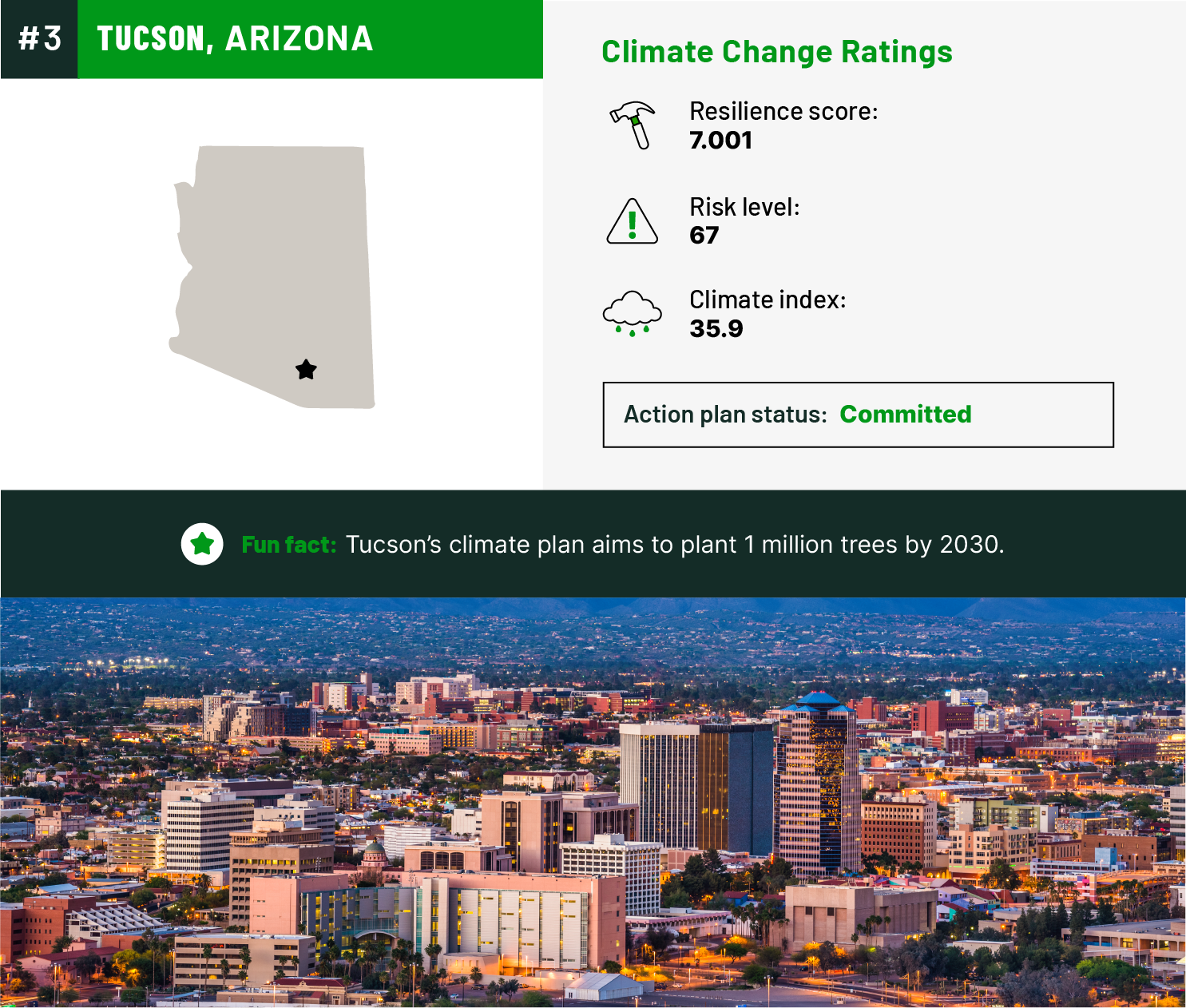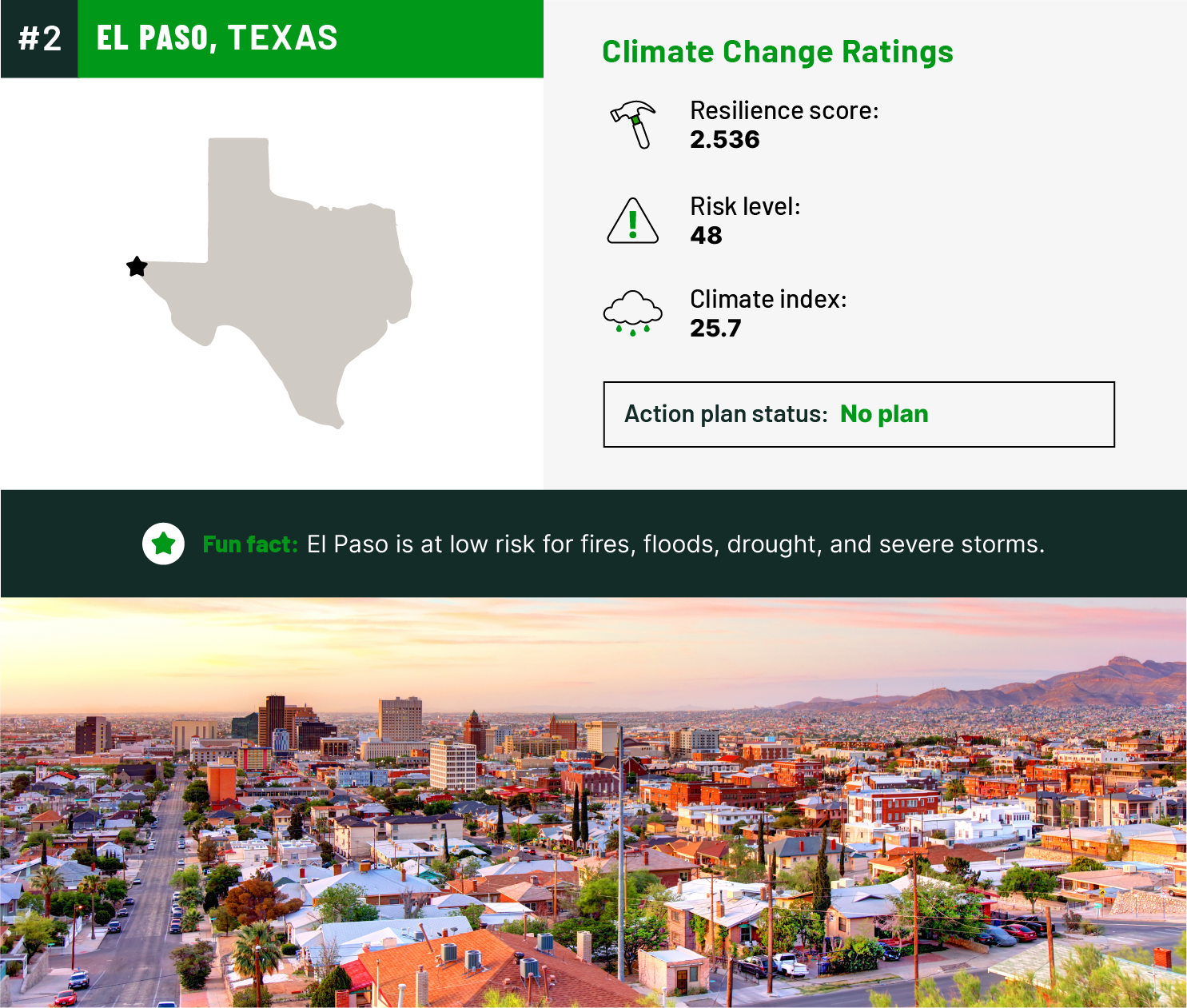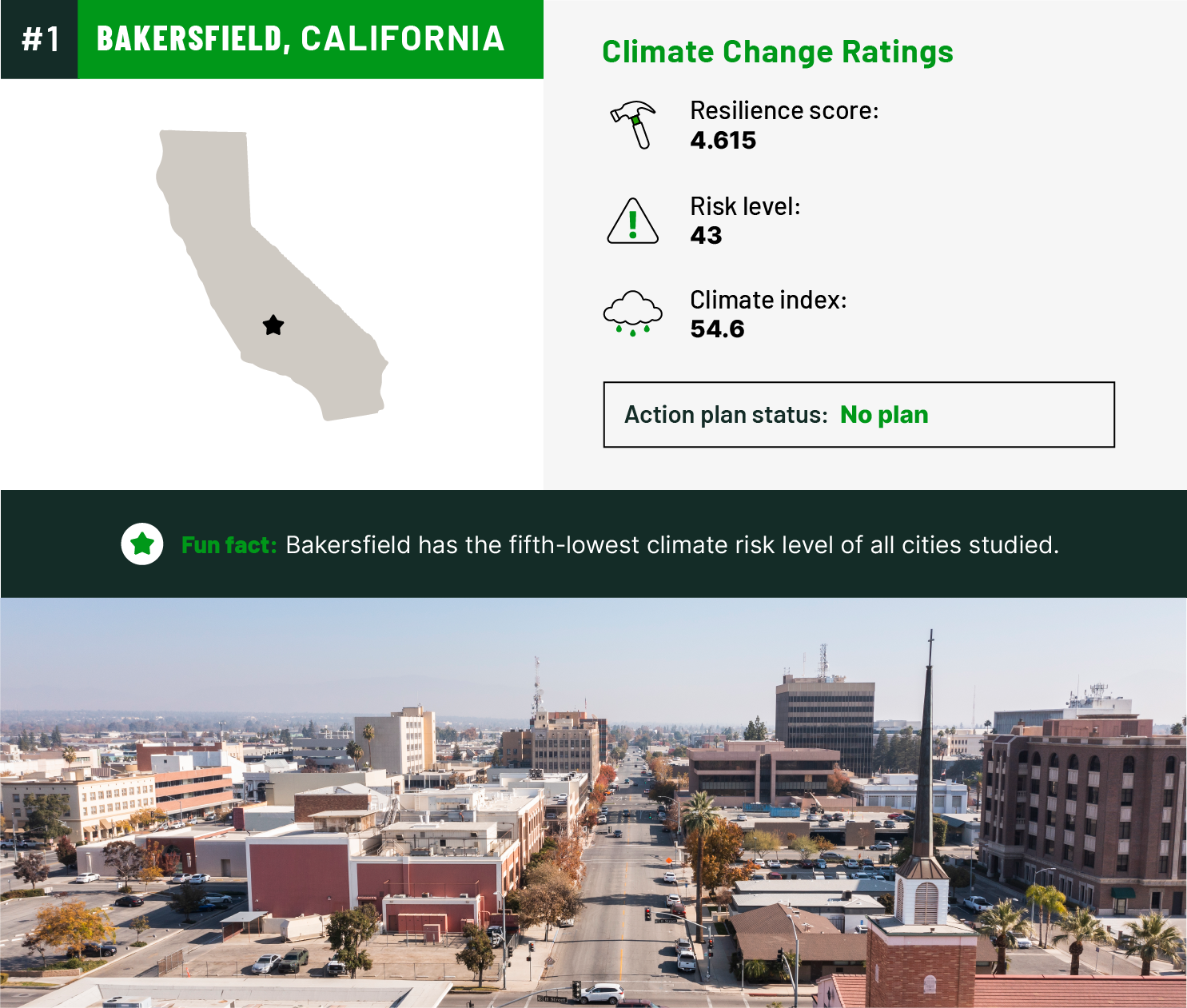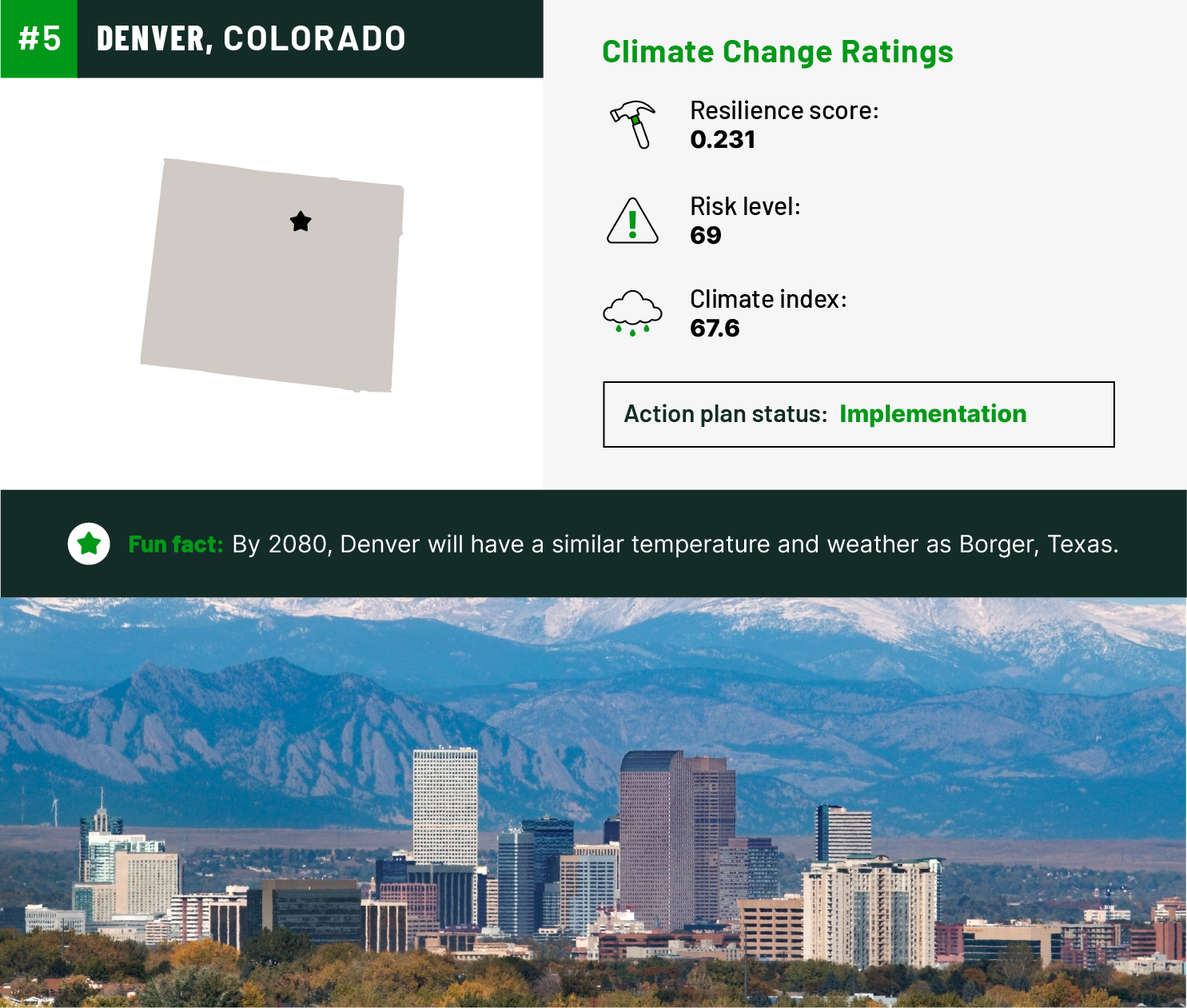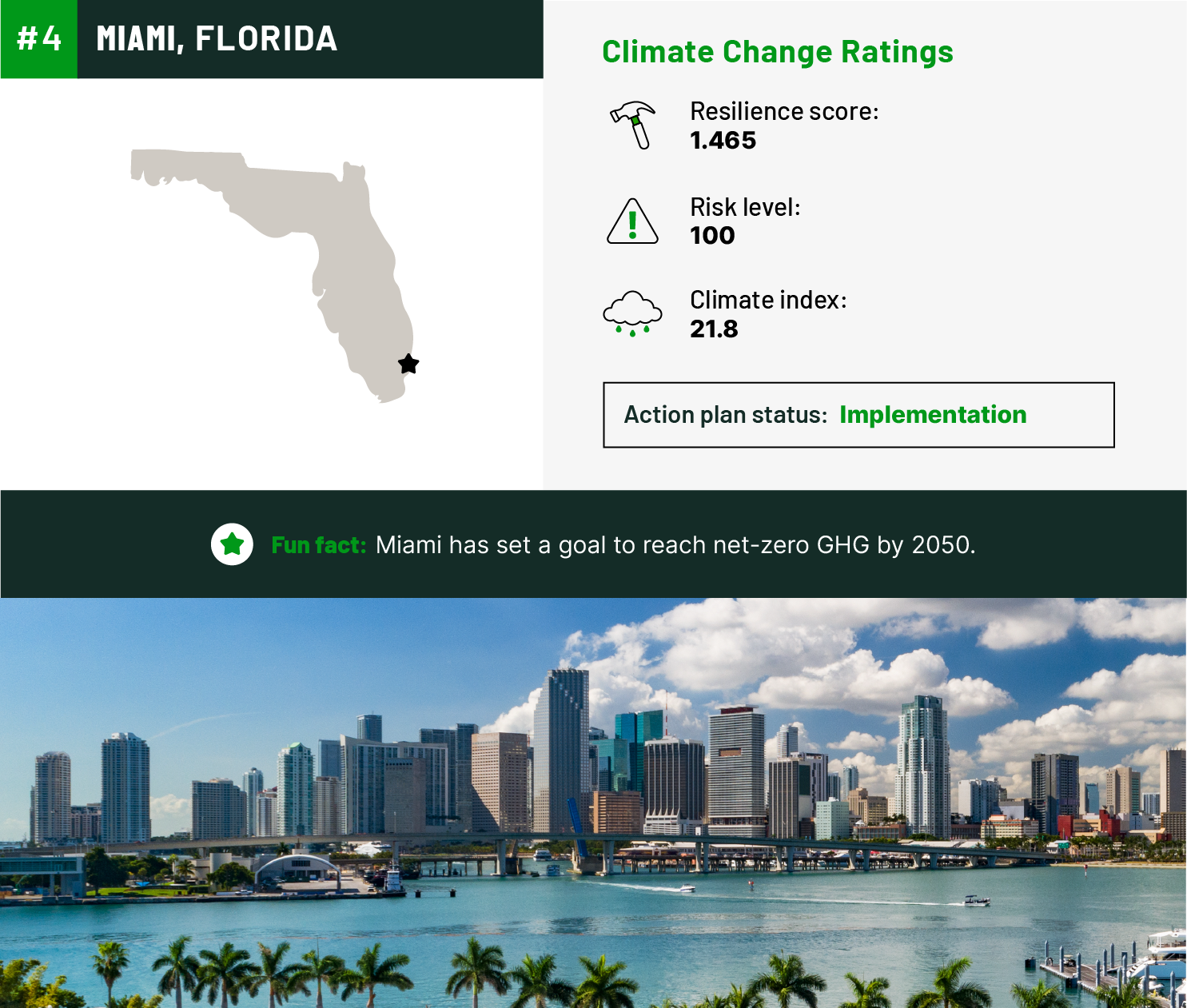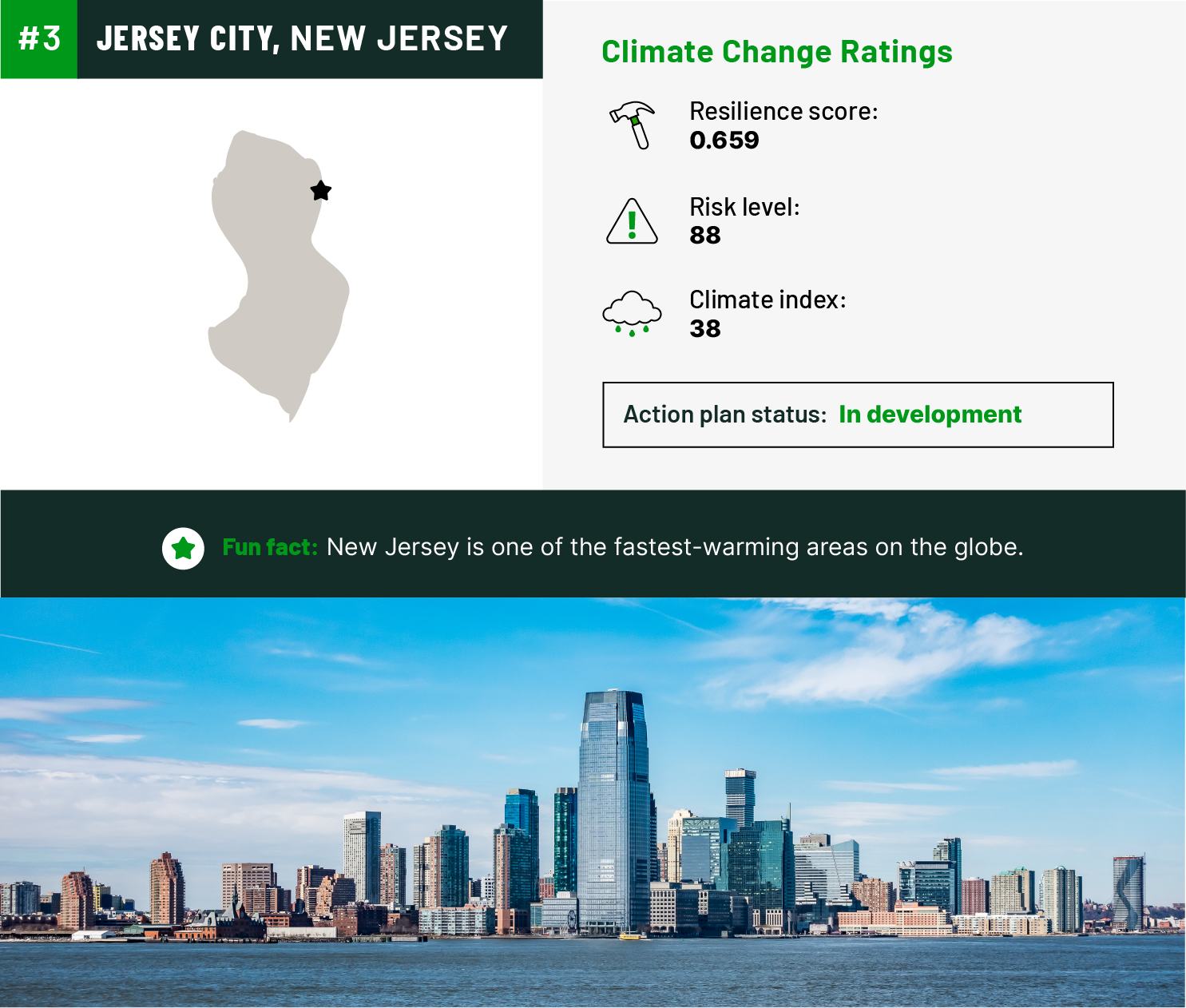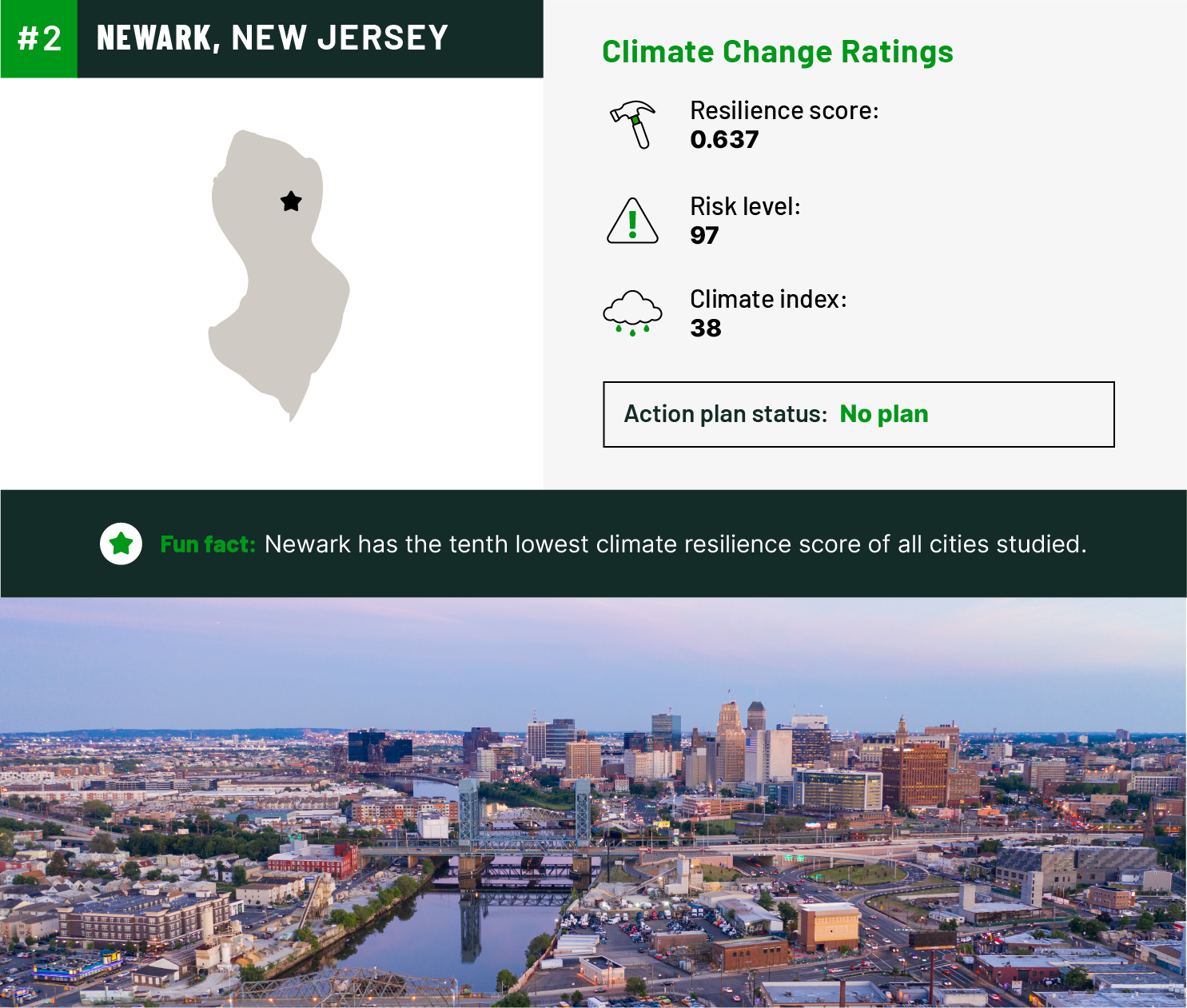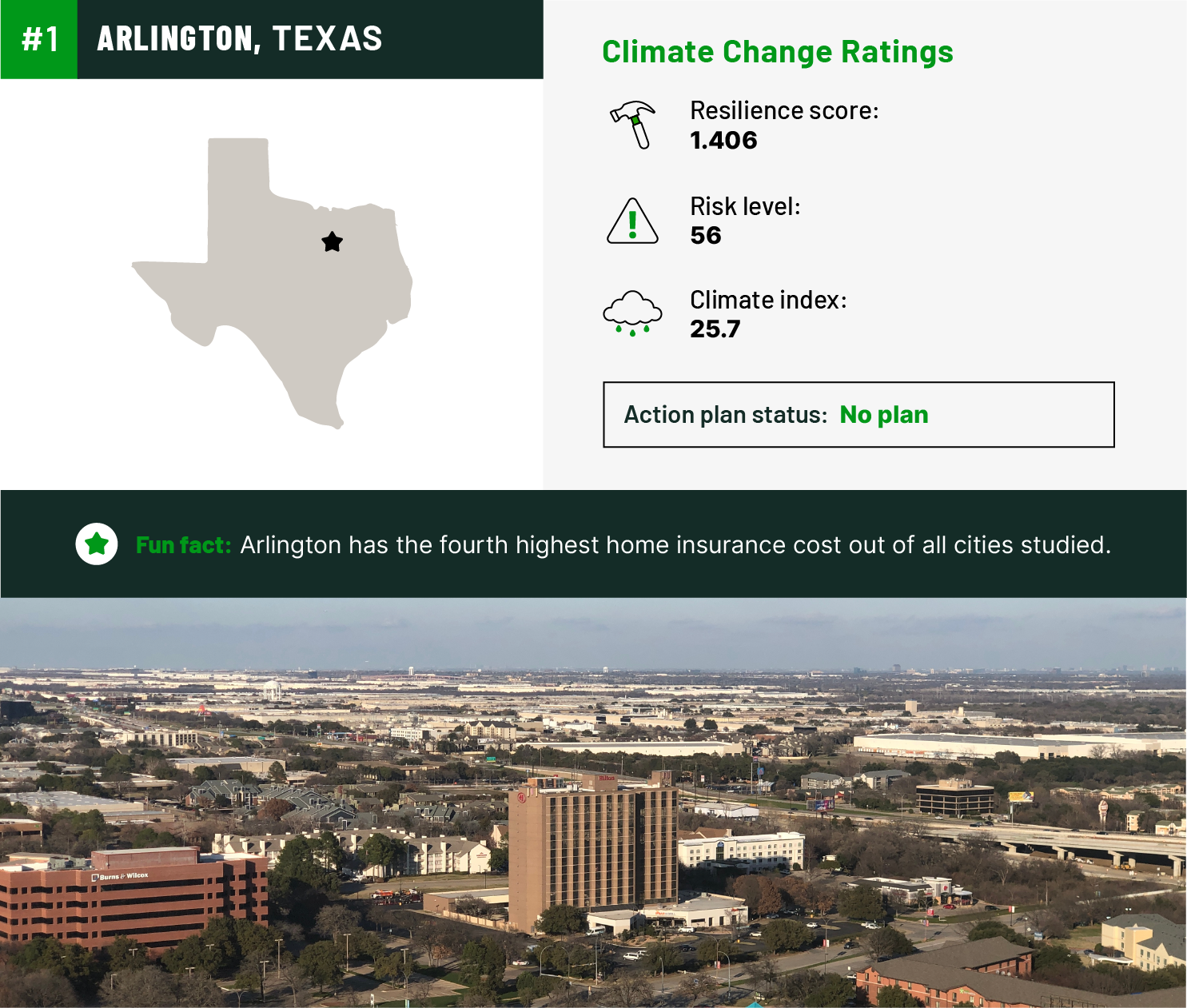20 Best Cities for Climate Change in 2022

You’d be hard-pressed to find a part of the country that hasn’t been affected by climate change in one way or another. From an increase in natural disasters to hotter summers and colder winters, climate change has touched homeowners coast to coast. But there are places that experience fewer negative effects than others, and the homes in the best cities for climate change are selling out fast.
Our recent homeownership report found that climate change is becoming an increasingly important factor for homebuyers. Both first-time homebuyers and younger generations said they considered climate change factors such as green building materials, location, floodplains, and local climate stances when making their final decisions. Our recent extreme weather survey also found that 48% of U.S.-based homeowners chose to research the impact of extreme weather events before buying their homes.
But when it comes to the data — what cities stand out from the pack? Below are the results of our study for the top 20 U.S. cities for climate change and an in-depth look at where you should (and maybe shouldn’t) settle down.
- Bakersfield, California
- El Paso, Texas
- Tucson, Arizona
- Boise, Idaho
- Laredo, Texas
- Reno, Nevada
- Riverside, California
- Fresno, California
- Madison, Wisconsin
- San Francisco, California
- Stockton, California
- Milwaukee, Wisconsin
- Buffalo, New York
- Fort Wayne, Indiana
- Lincoln, Nebraska
- Albuquerque, New Mexico
- Sacramento, California
- Paradise, Nevada
- Cleveland, Ohio
- San Jose, California
Table of Contents:
5 best climate-friendly cities to buy a home
Temperate weather, affordable home insurance rates, and low risks of disasters — these are just some of the things that the best cities for climate change have in common. If you want your home to have the best chance at surviving the elements, consider the following cities when buying your home.
Below is a quick breakdown of some of the data we analyzed to create this study. For more information, check out our methodology section.
- Cumulative Resilience Screening Index (CRSI) score
- This score is calculated by the EPA to determine an area's resilience to meteorological events and natural hazards. The higher the score, the more resilient the area.
- Climate change risk level
- Created by ClimateCheck.com, a 0-100 rating is given based on an area’s risk of climate change-related hazards compared to other areas in the United States. The lower the score, the lower the risk level.
- Climate change index
- Policygenius analyzed several climate change-related factors to determine which states are best and worst for climate change. A higher score indicates a better outlook on a low-emissions future, while a lower score means a worse outlook.
5. Laredo, Texas
Nestled right on the southern border of Texas, Laredo might not be your first thought when it comes to climate-friendly cities. But there’s more than meets the eye in The Gateway City, meaning it’s not just a beautiful blend of Mexican and American cultures (though that's certainly a huge selling point). Laredo has a high Cumulative Resilience Screening Index score and a low risk of disasters like fire and severe storms, indicating that even as our planet changes, Laredo homeowners won’t need to worry too much about natural disasters.

| Median home price: | $184,086 |
| Average home insurance premium: | $2,242 |
| Cost of living: | 82.6/100 |
| Comfort index: | 6.4/10 |
| CRSI score: | 8.063 |
| Climate change risk level: | 79/100 |
| Climate change index: | 25.7/100 |
| Climate action plan status: | No plan |
4. Boise, Idaho
Boise, Idaho, is actually a pretty great place to buy a home if you want to avoid the negative effects of climate change. Boise was recently given one of the highest Cumulative Resilience Screening Index scores of all cities studied. Add to that their relatively low-risk rating, and it's clear there's almost no better city poised to bounce back from whatever comes its way.

| Median home price: | $523,760 |
| Average home insurance premium: | $1,216 |
| Cost of living: | 93.7/100 |
| Comfort index: | 7.3/10 |
| CRSI score: | 3.77 |
| Climate change risk level: | 50/100 |
| Climate change index: | 44.5/100 |
| Climate action plan status: | No plan |
3. Tucson, Arizona
With over 286 sunny days and only 12 inches of rain every year, Tucson is a sunshine lover's paradise. Add to that a low cost of living and a high CRSI score, and Tucson is poised to become a mecca for homeowners looking toward the future. Though there are a few concerns Arizona homeowners need to be aware of, such as drought and extreme heat, the city already has a plan in place to help combat climate change and keep its city thriving for years to come.

| Median home price: | $300,294 |
| Average home insurance premium: | $1,521 |
| Cost of living: | 89.4/100 |
| Comfort index: | 7.5/10 |
| CRSI score: | 7.001 |
| Climate change risk level: | 67/100 |
| Climate change index: | 35.9/100 |
| Climate action plan status: | Committed |
2. El Paso, Texas
Want to move to a city where your home is at low risk for fire, flood, drought, and severe storms? Who doesn’t? El Paso ranks low on the climate change risk level for all of these factors, meaning your home will be that much safer from the negative effects of our changing climate. And while they don’t have a climate action plan as of yet, they do have low home prices and cost of living, meaning you can save money while you wait for a plan to fall into place.

| Median home price: | $182,377 |
| Average home insurance premium: | $2,361 |
| Cost of living: | 82.2/100 |
| Comfort index: | 8/10 |
| CRSI score: | 2.536 |
| Climate change risk level: | 48/100 |
| Climate change index: | 25.7/100 |
| Climate action plan status: | No plan |
1. Bakersfield, California
The best city for climate change is Bakersfield, California. But what exactly, other than the relatively low home prices for the state, makes this city such a great place to live? Bakersfield is home to the fifth-lowest climate risk level of all 100 cities studied in addition to a high resilience score, making it a great city for long-term real estate investment.

| Median home price: | $353,987 |
| Average home insurance premium: | $800 |
| Cost of living: | 91.8/100 |
| Comfort index: | 8.1/10 |
| CRSI score: | 4.615 |
| Climate change risk level: | 43/100 |
| Climate change index: | 54.6/100 |
| Climate action plan status: | No plan |
5 cities worth reconsidering when looking to buy a home for climate change
Now that we’ve covered the best cities for climate change, you might be asking yourself, where should I not move? When considering where to buy your home, it’s important to recognize the area’s resilience to climate change, its risk of natural disasters, and what the local government is doing to improve the city. Below are the five cities that may experience the brunt of climate change.
Already settled in these areas, or unable to move away for one reason or another? Don’t panic. If you are going to buy a home in these areas, find the safest areas of these cities using tools like FEMA’s Flood Map or this Fire and Smoke map to give yourself the best chance at a positive long-term investment.
5. Denver, Colorado
The Mile High City is not immune to climate change. In fact, a recent study found that by 2080 Denver will feel more like a town in Texas than Colorado, with warmer temperatures and less snow than its residents are currently experiencing. The EPA has also rated Denver pretty low on the resilience index, meaning Denver homeowners will need to be prepared to update their homes as their surroundings change. However, the city is currently implementing a climate action plan to help combat some of these negative impacts.

| Median home price: | $599,742 |
| Average home insurance premium: | $2,886 |
| Cost of living: | 113/100 |
| Comfort index: | 7.3/10 |
| CRSI score: | 0.231 |
| Climate change risk level: | 69/100 |
| Climate change index: | 67.6/100 |
| Climate action plan status: | Implementation |
4. Miami, Florida
Though Miami, Florida, may be coined Magic City, its coastal location means its climate change risk is anything but magical. At an extremely high propensity for flooding, extreme heat, and hurricanes, Miami homeowners will need to do some prep work to make sure their homes can stand up to the elements. The good news? Miami does have a climate strategy in place with the goal to reach net-zero greenhouse gas emissions by 2050.

| Median home price: | $469,562 |
| Average home insurance premium: | $4,083 |
| Cost of living: | 116.2/100 |
| Comfort index: | 6.4/10 |
| CRSI score: | 1.465 |
| Climate change risk level: | 100/100 |
| Climate change index: | 21.8/100 |
| Climate action plan status: | Implementation |
3. Jersey City, New Jersey
Coastal homes are always at a higher risk for the effects of climate change than their inland counterparts. Due to New Jersey’s size and location, pretty much every home in the state is susceptible to flooding, hurricanes, and related damage. Add to that a high cost of living and home prices, and you may want to consider planting roots outside of Jersey City.

| Median home price: | $576,986 |
| Average home insurance premium: | $1,898 |
| Cost of living: | 122.5/100 |
| Comfort index: | 7.3/10 |
| CRSI score: | 0.659 |
| Climate change risk level: | 88/100 |
| Climate change index: | 38/100 |
| Climate action plan status: | Developing |
2. Newark, New Jersey
Are you surprised to see another NJ city on this list? You shouldn’t be. With the recent hurricanes, Irene and Sandy-damaged homes, and the wiped out power across the state for weeks, New Jersey has fallen most vulnerable to the effects of climate change and will likely continue to do so. Due to Newark’s location and lack of a climate action plan, the city is higher on the list than its neighbor Jersey City.

| Median home price: | $384,391 |
| Average home insurance premium: | $1,980 |
| Cost of living: | 119.1/100 |
| Comfort index: | 7.2/10 |
| CRSI score: | 0.637 |
| Climate change risk level: | 97/100 |
| Climate change index: | 38/100 |
| Climate action plan status: | No plan |
1. Arlington, Texas
The worst city for climate change turns out to be none other than Arlington, Texas. Scoring in the bottom half of all cities studied for climate change resilience, Arlington is also at high risk for extreme heat, drought, and severe storms. The city also doesn’t have a climate plan in place to help combat these risks, though that doesn’t mean they won’t get hip to the idea in the future.
Bottom line: If you are still deciding where to buy a home, it’s probably a good idea to avoid this area for long-term home value and low disaster risk.

| Median home price: | $300,723 |
| Average home insurance premium: | $3,953 |
| Cost of living: | 95.1/100 |
| Comfort index: | 7.2/10 |
| CRSI score: | 1.406 |
| Climate change risk level: | 56/100 |
| Climate change index: | 25.7/100 |
| Climate action plan status: | No plan |
How will climate change affect homes?
If climate change is teaching us anything, it's that we all need to do our part to help mitigate the problem. In addition to developing eco-friendly habits, it’s also a smart move to help prepare your home for the changes our climate will be experiencing in the years to come.
From an increase in damage from natural disasters to more wear and tear as our seasons become more extreme, there are a lot of ways climate change will impact homes. All the more reason to upgrade your home with the latest technology to avoid small issues from becoming big problems. Other storm-friendly tips for keeping your home secure include adding alternative energy sources to your home, upgrading your appliances to be more energy efficient, and proactively assessing your policy to ensure it fits your home’s changing needs.
Where should you move to avoid climate change?
While it’s clear that some cities are better prepared for dealing with climate change than others, ultimately what city you move to should be dependent on your unique needs and interests. Take the quiz below to learn which of the top five cities is the best suited for your lifestyle.
Which climate-friendly city should you buy a home in?
Home insurance for the future
Dealing with climate change is all about prevention and protection. Funnily enough, the same can be said about home insurance. By taking the time early on to get your home fully protected from the elements, you can save yourself a lot of money down the road. Our policies are catered to this idea. We also offer Hippo Home to help homeowners with home maintenance and ownership.
Outside of working with a forward-thinking company, another great way to make sure your home can stand up to climate change is to add in the latest smart home devices that’ll help safeguard your home over the long term. And if you’re renovating or building your home from the ground up, you may want to look at working with climate-friendly building materials to ensure it is built with sustainability in mind, which can mean lower maintenance costs and/or upkeep in the future.
When deciding where to buy a home — and where to get home insurance — it’s important to do your research. For a policy that stomps out the competition and is always looking toward the future, turn to Hippo.
Methodology: This study was conducted from February to March 2022. To identify the best cities for climate change, the team at Hippo pulled the following data sets for the 100 most populous cities in the United States:
- Average cost of a home (Source: Zillow)
- Weight: .09
- Average cost of home insurance (Source: Insurance.com)
- Weight: .08
- Comfort index — average of summer and winter scores (Source: BestPlaces)
- Weight: .06
- Cost of living (Source: City Data)
- Weight: .05
- Cumulative Resilience Screening Index (CRSI) (Source: EPA)
- Weight: .24
- Climate change risk report (Source: ClimateCheck)
- Weight: .20
- Climate change index (Source: Policygenius)
- Weight: .16
- Climate action plan status (Source: Zero Energy Project)
- Weight: .12
Several cities in our list didn’t have complete data sets (e.g., Anchorage and Honolulu) so while they were still considered, they scored much lower on our list due to missing information.
To determine the score, we assigned a weight out of 100 to every piece of data, based on the most important factors for those looking to buy a home in a climate-friendly city. The scores assigned to each city were then given a ranking, and cities with the highest scores were selected as the best cities for climate change.



